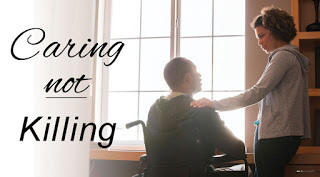Catholic Medical Quarterly Volume 71(3) August 2021
Papers
Euthansaia and Assisted Suicide in Canada
Alex Schadenberg
 We asked
Alex Schadenberg the Executive Director of the Euthanasia Prevention
Coalition in Canada five questions about assisted suicide there.
We asked
Alex Schadenberg the Executive Director of the Euthanasia Prevention
Coalition in Canada five questions about assisted suicide there.
- How was assisted suicide “sold” to the people of Canada?
- What kinds of safeguards were promised?
- Since legalisation, have there been concerns about the rates of assisted suicides? What are the current figures? Are the promised safeguards working?
- What do most Canadians think about legalised assisted suicide?
- You have not given up on this issue. What sorts of things are you doing?
Here are his replies.
Canada legalized euthanasia (death by lethal injection) and assisted suicide (death by lethal prescription) in June 2016 after the Supreme Court of Canada Carter decision in 2015. The Supreme Court decision was based on the idea that prohibiting euthanasia and assisted suicide was an overreach of the law, but the decision insisted that parliament needed to establish a series of"safeguards" in the law to ensure effective oversight of the law.
After the Supreme Court decision, the government received polling results which indicated that Canadians did not want assisted death for minors (under 18),for people with mental health conditions, for people who were not dying and they also wanted a reflection period within the law.
Bill C-14 therefore stated that to access assisted dying, a person would need to be over 18 years of age, competent at the time of death, and their natural death must be deemed reasonably foreseeable and they included a 10 day waiting period.
What is interesting about the law is that it was intentionally written with double language. For instance, it did not define the meaning of "natural death is reasonably foreseeable," it stated that assisted death could be approved for physical or psychological suffering that the person requesting death deemed unacceptable, and it stated that a doctor or nurse practitioner could waive the 10 day waiting period.
By not defining the phrase "natural death is reasonably foreseeable" and by enabling the terms physical and psychological suffering to be completely subjective, they in fact created a pathway for the constant expansion of the acceptable practise for legalised killing.
Soon after legalization, the phrase "natural death is reasonably foreseeable" was challenged in the courts in British Columbia and Quebec. In September 2019, Québec Superior Court Justice Baudouin struck down the requirement in the law that a person's natural death be reasonably foreseeable. The federal government did not appeal this decision, which has now led to a new euthanasia bill (Bill C-7) to expand Canada's euthanasia law.
By striking down the phrase "natural death is reasonably foreseeable" the court eliminated the requirement that a person have a terminal condition. Since the law already allowed assisted death for physical or psychological suffering, the decision expands euthanasia to people who are not terminally ill and who seek death based on psychological suffering.
Canada is now debating Bill C-7. Canada's federal government decided to make changes to the law that went beyond the requirement of the Québec court. Bill C-7 eliminates the requirement that a person's natural death be reasonably foreseeable, it eliminates the 10 day waiting period and it eliminates the requirement that a person be competent at the time of death. Bill C-7 claims to prohibit assisted death for mental illness, but it has not defined the term psychological suffering, which means it is not actually prohibiting assisted death for mental illness.
In other words, the safeguards in the law lacked effective definition and are now being eliminated from the law because they are seen as a hindrance rather than a protection. All of this occurred since Canada legalized euthanasia and assisted suicide in June 2016.
But it goes further. The number of assisted deaths sky-rocketed beyond anyone's predictions. People who support assisted death are saying that this is due to the success of the law, whereas a careful examination of the law shows that the massive number of deaths is related to the fact that the law lacks clear definitions and the application of the law has quickly expanded.
The federal government released a report on assisted dying in July that stated there were 5631 assisted deaths in 2019, 4467 in 2018, 2833 in 2017 and 1015 in the last six months of 2016.
The numbers lack meaning outside of the stories. In August 2016, Candice Lewis (25), who was born with multiple disabilities, while receiving treatment at a Newfoundland hospital was pressured to "request" an assisted death. Candice was very sick but, as Candice's mother told CBC news, the doctor pressured her to request physician-assisted death. Candice never asked for it and lived to tell her story.
In August 2019, Alan Nichols died by euthanasia, even after his family insisted that Alan was not competent to make this decision and that he was living with chronic depression.
Currently there is a legal battle in Nova Scotia concerning a man who was approved for assisted death, even though his wife and several assessors for euthanasia indicated that he is not dying anytime soon. There are clear questions about his competency concerning his medical condition.
The sad reality is that euthanasia has been normalized within Canada's medical system very fast. Doctors who oppose euthanasia are being pressured and hospices that refuse to participate in euthanasia are being defunded.
In Ontario, if a doctor receives a request for an assisted death, the doctor does not have to do euthanasia but must provide a referral to a doctor who will do the act. Doctors who oppose euthanasia are not willing to cooperate with the act by sending their patients to a doctor who will kill and are now in fear of being disciplined. Some doctors have left Canada.
 The
Delta Hospice Society, in British Columbia, has refused to participate in
euthanasia. The BC Ministry of Health informed the Delta Hospice that they
will lose their funding in February 2021 if they are unwilling to offer
euthanasia.
The
Delta Hospice Society, in British Columbia, has refused to participate in
euthanasia. The BC Ministry of Health informed the Delta Hospice that they
will lose their funding in February 2021 if they are unwilling to offer
euthanasia.
Just the other day I was speaking to a friend who was caring for a neighbour with cancer. The doctor urged my friend's neighbour to stop treatment, because it was becoming futile, and die by (lethal injection) euthanasia. My friend tried to convince the neighbour’s that this was the wrong way to go. The doctor didn't even bother to inform the neighbors wife that her husband agreed to die by euthanasia. She asked "how do they know that he is dying on Thursday." Afterwards she was upset with how it all happened, but he was dead.
The fact is that killing people, even for supposed compassionate reasons, is wrong. Doctors gain power over patients who fear for their future. Society needs to find caring solutions to these problems. We cannot remain silent when a culture accepts killing over caring because, like cancer, it spreads.
Alex Schadenberg, Executive Director – Euthanasia Prevention Coalition
